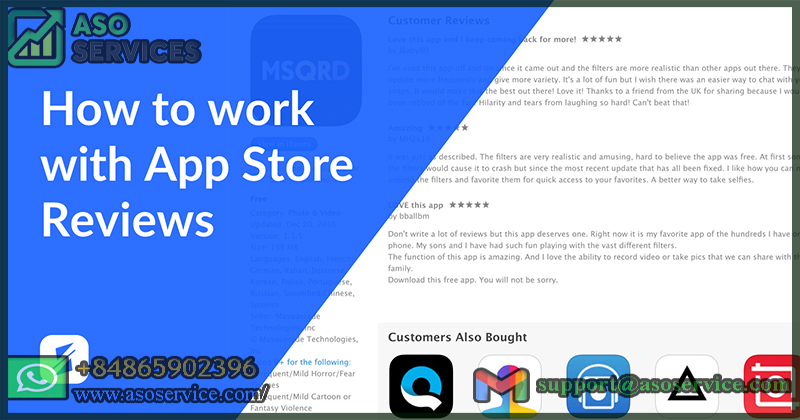Effective app store review management is a critical component of maximizing the success of your app, as it can help you build positive relationships with users, improve your reputation, and gain valuable insights into user needs.
Related posts
Top Best Action Mobile games 2023 on Google Play and App Store
Mastering Mobile App Analytics: The Key to Driving Growth, Engagement
1. Encourage User Reviews for App Store review management
To improve your app's reputation, encourage users to leave reviews. You can do this by prompting them to leave a review; after using your app for a certain period or after completing a specific task.

Encourage User Reviews for App Store review management, Source: asoservice.com
Encouraging user reviews is an essential aspect of effective app store review management. Here are a few strategies you can use to encourage more reviews:
- Prompt users to leave a review: After a user has used your app for a certain period or completed a specific task, prompt them to leave a review. Ensure the prompt is manageable and gentle, or it may annoy users.
- Offer an incentive: Consider offering an incentive, such as a discount or free content, for users who leave a review. This can be a powerful motivator for some users.
- Make it easy to leave a review: Ensure that the process of leaving a review is as easy as possible. This means minimizing the required steps and avoiding technical issues preventing a user from leaving a review.
Overall, encouraging more reviews can improve your app's reputation and increase your visibility in the app store. However, it's important to remember that; not all reviews will be positive, so be prepared to respond to negative feedback.
2. Respond to Reviews for App Store review management
Engage with your users by responding to their reviews. Whether positive or negative, responding to reviews shows that you value their feedback and can help you build a positive relationship with your users.
Responding to user reviews is crucial to effective app store review management. Here are some key benefits of responding to reviews and a few best practices to keep in mind:
Benefits:
- Build relationships with users: Responding to reviews shows users that you care about their feedback and are committed to improving your app.
- Improve your reputation: Responding to negative reviews professionally and helpfully can improve your app's reputation, as it demonstrates that you take user feedback seriously and are working to address issues.
- Gain insights into user needs: Reviews can provide valuable insights into user needs and preferences. By responding to reviews, you can better understand what users are looking for and use that information to improve your app.
Best Practices:
- Respond to all reviews: It demonstrates that you value user feedback, even if it's just a simple thank you for a positive review.
- Be polite and professional: When responding to negative reviews, remaining calm and professional is essential. Acknowledge the user's concerns and offer solutions or next steps.
- Don't argue with users: It's essential to avoid getting into arguments or debates with users, even if they are being unreasonable. Stay focused on finding solutions and improving the user experience.
Responding to reviews is a vital part of effective app store review management. By engaging with users positively and helpfully, you can build relationships, improve your reputation, and gain valuable insights into user needs.
3. Use Reviews to Improve Your App
Please pay attention to the feedback you receive in reviews and use it to make improvements to your app. Look for common complaints or suggestions and use them to make changes that will improve the user experience.
Using reviews to improve your app is essential to effective app store review management. Here are a few strategies you can use to leverage user feedback to more people to get app installs:
- Look for common themes: Read through your reviews and look for common themes or issues that users mention. If multiple users are experiencing the same problem or requesting the same feature, it's worth addressing.
- Prioritize feedback: Once you've identified common themes or issues, prioritize the feedback based on how important it is to users and how difficult it will be to implement. Addressing the most critical issues will have the most significant impact on improving the user experience.
- Respond to feedback: When you make changes to your app based on user feedback, communicate those changes to users. Respond to reviews and let users know you've addressed their concerns or implemented suggestions.
- Monitor the impact: After making changes based on user feedback, monitor the impact on your app's ratings and reviews. This can help you see if your changes are having the desired effect and identify any new issues that arise.
- Continuously iterate: Using user feedback to improve your app is an ongoing process. Make it a priority to regularly review and respond to user feedback and use that feedback to guide ongoing development and updates.
Overall, using reviews to improve your app is vital to effective app store review management. By listening to user feedback and making changes based on that feedback, you can improve the user experience and build a more successful app.
4. Monitor Your Reputation for App Store review management
Regularly monitor your app's reputation by checking reviews, ratings, and feedback. This will help you stay on top of any issues or negative comments and allow you to respond quickly to any problems that arise.
Monitoring your app's reputation is critical to effective app store review management. Here are a few reasons why reputation monitoring is essential, as well as some best practices to keep in mind:
Benefits:
- Identify and address issues quickly: By monitoring your app's reputation, you can quickly identify any negative reviews or issues and take action to address them. This can help prevent issues from spiraling out of control and damaging your app's reputation.
- Gain insights into user needs: Reviews can provide valuable insights into user needs and preferences. By monitoring your app's reviews, you can better understand what users are looking for and use that information to guide future development.
- Monitor your competition: Monitoring your app's reputation also involves keeping an eye on your competition. By tracking their reviews and ratings, you can identify areas where they are succeeding or falling short and adjust your strategy accordingly.
Best Practices:
- Regularly review your app's ratings and reviews: Set aside time to review your app's ratings and reviews. Look for common themes or issues, and respond to reviews as appropriate.
- Use reputation monitoring tools: A variety of reputation monitoring tools are available that can help you track your app's ratings, reviews, and overall reputation.
- Be proactive: Take action before negative reviews or issues arise. Proactively solicit feedback from users, and make changes based on that feedback.
- Stay engaged: Keep users informed of any changes or updates to your app, and respond to their feedback promptly. This can help build a positive relationship with users and improve your app's reputation.
Monitoring your app's reputation is critical to effective app store review management. By staying on top of your app's ratings and reviews, you can quickly identify and address issues, gain valuable insights into user needs, and stay ahead of the competition.
5. Addressing technical issues quickly
Addressing technical issues quickly is a crucial part of effective app store review management. Technical issues can negatively impact the user experience and lead to negative reviews, which can in turn harm your app's reputation and visibility.
Here are some strategies for addressing technical issues quickly:
- Use crash reporting tools: Set up crash reporting tools like Firebase Crashlytics or Instabug to receive alerts when your app experiences a crash. This can help you quickly identify and address technical issues.
- Monitor app reviews: Monitor your app's reviews regularly to get app reviews to identify any technical issues that users are experiencing. Address these issues promptly by providing a fix or a workaround in response to the review.
- Prioritize critical issues: Prioritize critical issues that have the potential to impact a large number of users, such as issues that prevent users from logging in or accessing core functionality.
- Provide timely updates: Provide timely updates to your app to address technical issues and improve overall functionality.
- Test thoroughly: Thoroughly test your app before releasing updates to ensure that new features and fixes are working properly. Consider using beta testing to get feedback from a smaller group of users before releasing updates to the wider public.
By addressing technical issues quickly and effectively, you can improve the user experience and maintain a positive relationship with your users. This, in turn, can help you maximize your app's success in the app store.
6. Using app store optimization (ASO) best practices
Using app store optimization (ASO) best practices is an important part of effective app store review management. By optimizing your app's listing in the app store, you can improve your app's visibility, attract more downloads, and encourage positive reviews.
Here are some ASO best practices for app store review management:
-
Use relevant keywords: Use keywords in your app's title, description, and metadata that accurately describe your app and the problems it solves. Use tools like Google Keyword Planner or App Annie to identify high-volume, low-competition keywords.
-
Optimize your app's icon and screenshots: Your app's icon and screenshots are the first things that users see in the app store, so make sure they're eye-catching and accurately represent your app. Use high-quality images and choose a color scheme that stands out.
-
Provide a clear and compelling app description: Your app's description should clearly communicate what your app does and why users should download it. Use bullet points and short paragraphs to make the description easy to read.
-
Encourage positive reviews: Encourage satisfied users to leave positive reviews by including a call-to-action in your app or in your marketing materials. Consider offering incentives, like in-app rewards or a chance to win a prize, for leaving a review.
-
Monitor your app's ratings and reviews: Monitor your app's ratings and reviews regularly to identify any issues or trends that need to be addressed. Use this feedback to make improvements to your app and respond to negative reviews.
-
Continuously iterate and improve: ASO is an ongoing process. Continuously test and iterate your app's listing to improve its performance and attract more users.
By following these ASO best practices, you can improve your app's visibility and attract more downloads. This, in turn, can help you maximize your app's success in the app store and encourage positive reviews from satisfied users.
Conclusion
In conclusion, by implementing effective strategies for app store review management, such as encouraging user reviews, responding to feedback, using reviews to improve your app, monitoring your reputation, and analyzing review data, you can build a strong foundation for the success of your app in the highly competitive world of mobile apps.
Related posts
https://asoservice.com/optimize-ASO
https://asoservice.com/top-app-keyword-ranking
Source: https://asoservice.com/














Leave a Reply
Your e-mail address will not be published. Required fields are marked *